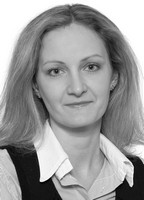Organization of intelligent athletes' club as new form of organization of sports work in educational institutions
Фотографии:
ˑ:
Organization of intelligent athletes' club as new form of organization of sports work in educational institutions
E.O. Panova, postgraduate
L.V. Razumova, postgraduate
L.I. Kostunina, associate professor, Ph.D.
Ulyanovsk state pedagogical university, Ulyanovsk
Key words: physical culture and sport, schoolchildren, club, intelligent athletes, sports-recreative work, forms of organization, selection of kind of sport, interest formation, correspondence of motor and intellectual activities.
Mastering of means of analysis of various muscle feelings and constant monitoring of motor actions promotes effective control of physical development.
Psychomotorics is directly correlated with preliminary creation of the motor model, requiring cerebral work in construction of movements and provides for perfection of control mechanisms of motor activity, creating conditions for expansion of cognitive abilities.
School lessons of physical culture with the main task of organization of motor actions have all capacities not only for development of psychomotics but also for stimulation of intellectual qualities. Pupil acquires skills of independent performance of motor acts by means of modeling of every new physical exercise according to the worked model.
The purpose of the present paper was theoretical and methods substantiation of advisability of development of intelligent athletes' club as one of its new forms of sports-mass school work appealed to provide active introduction of schoolchildren in sports recreative and sports-mass activities.
The subjected new form of sports-recreative and sports-mass work had proved its effectiveness. Creation of the club promoted substantial expansion of the framework of activity of sports active on the matters of organization of individual training activity with pupils by means of physical culture and sport, promoting schoolchildren's reconsidering of their attitude to physical culture and sport, seeing its value in realization of the tasks of self-esteem and self-perfection.
Bibliography
1. Balsevich, V.K. Health-saving fucntion of education /V.K. Balsevich// Obrazovatelnaya politika. – 2007. – № 6. – P. 4–9. (In Russian)
2. Vizitey, N.N. Physical culture and sport as a social phenomenon: philosophic essays / N.N. Vizitey. – Kishinev: Shtiintza, 1986. – 164 P. (In Russian)
3. Lubysheva, L.I. Sports culture at school / L.I. Lubysheva. – Мoscow: Teoriya i praktika fizicheskoy kultury i sporta, 2006. – 174 P. (In Russian)
4. Neverkovich, S.D. Pedagogics of physical culture and sport: textbok for students of higher educational institutions of the speciality "Physical culture and sport" / S.D. Neverkovich. – Мoscow: Academiya, 2010. – 329 P. (In Russian)
5. Rubinshteyn, S.L. The basics of general psychology / S.L. Rubinshteyn. – Мoscow: Uchpedgiz, 1946. – 704 P. (In Russian)
6. Starodubtseva, I.V. Intellectualization of physical education: state, problems, perspectives // Fizicheskaya kultura: vospitanie, obrazovanie, trenirovka. – 2010. – № 1. – P. 5–7. (In Russian)
7. Stolyarov, V.I. Modernization of physical education at comprehensive school /V.I. Stolyarov, VK. Balsevich, V.P. Mochenov, L.I. Lubysheva. – Мoscow: Teoriya i praktika fizicheskoy kultury i sporta, 2009. – 320 P. (In Russian)



 Журнал "THEORY AND PRACTICE
Журнал "THEORY AND PRACTICE